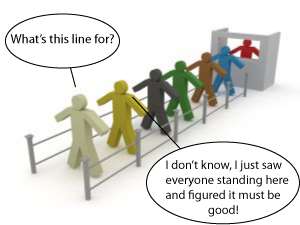The Four Truths of Social Proof, Plus How To Harness It In Your Marketing
Social proof has always been one of the most influential elements of marketing, and it’s especially important in our present digital age. It can be argued as a central form of persuasion.
Marketing has previously defined social proof as the information that potential buyers review as evidence that your solution is used and appreciated.
Although that definition still holds true, it’s only part of the truth, one piece of the puzzle. We understand social proof better than ever before.
The impact and necessity of stories
Humans are social animals. History of ancient civilizations and neanderthals depict how stories have always existed: carved on cave walls, painted in pyramids, contained on scrolls, or passed down verbally. Stories are how humans relate to one another, the world around us, and how we fit into the greater existence. Stories craft our understanding about life.
When you face new situations or environments, what do you do? You think about what other people have done who faced this circumstance before, or you look around and see what others are doing around you. If you’ve ever been in a foreign country, you’ve certainly experienced this! How do the locals order coffee? What did you friend, who traveled here last year, say about greeting new people? You naturally observe the natives and learn from the experiences of other travelers. (Thank you google, travel bloggers and social media for equipping international travelers!)
Buying a new product or service may feel similar to stepping into a foreign country. Everyone has their own opinion and you feel differently about the experience before, during and after it occurs. That’s where social proof comes to the rescue.
The 4 truths of Social Proof Theory
Robert Cialdini is a leading psychologist at Influence At Work, particularly in the area of influence. His social proof theory has changed the field of marketing forever. Why? He connected these influential scenarios to marketing:
- 9 out of 10 doctors recommend…
- If a crowd of people are looking at a something in the sky, you look up too.
- When you’re lost, you follow a person wearing professional clothes (because someone dressed so professionally must know what he/she is doing).
- 1,457 other readers highlighted this passage in your Kindle ebook.
- 79 people like this on Facebook, 973 people pinned this on Pinterest, and 655 people tweeted this piece of content on Twitter.
- 997 people have backed this Kickstarter campaign.
- 12,691 people have downloaded this ebook. What are you waiting for?
Do you feel persuaded to buy follow that doctor’s recommendation, highlight that ebook passage, share that piece of content or back that Kickstarter campaign? Chances are you find those simple phrases highly motivational and trustworthy. There are 4 truths that align social proof to be exceedingly effective, just like those examples above.
Social Proof Truth #1: Uncertainty
If something is uncertain, the human brain recognizes it as a potential threat. It’s a natural instinct hardwired in the brain from millions of years of being alert for predators - and it still informs our decision-making decisions like buying a new product or service.
When things are certain, it’s easy to make an instant decision. But uncertainty drives you to make a decision. Certainty means safety for your brain.
So it makes complete sense that you will pattern your decisions after the choices of others. If they were successful then it’s seems like a proven survival strategy that you will be successful as well.
If Bradley ate the berries and didn’t die, the maybe you can also eat the berries and not be poisoned. If he tried your product and had raging success, then perhaps you will also find the product as a solution to your problem.
Social Proof Truth #2: Similarity
In general, people are more likely to believe in a product or service if the people who review it are similar to them. If everyone who reviews your product is like Bradley, and I’m also similar to Bradley, then I’m going to be more persuaded that your product is right for me. However if reviews mainly come from individuals Alyssa, and she’s very different from me, then I’m not as likely to find her input helpful.
In reality, I may be like Bradley in some areas and like Alyssa in other areas. Sometimes the components of similarity are superficial, like the basic demographics of gender, age, level of education, profession or life experiences.
Don’t overlook the similarity of peers. Consider people associated with specific industries or areas of specialization. That helps your potential clients imagine themselves in the same spot as those peers, enjoying similar results and benefits.
Social Proof Truth #3: Expertise
If I’m a CEO, then the comments of three CEOs hold a larger amount of weight than a ten mid-level managers. But if I’m a mid-level manager decision maker, I’d be more swayed by the opposite.
Whichever scenario is true of your reader, they will come with their own set of doubts and objections. Viewing testimonials and detailed information specific to my doubts and objections will earn you my business. Aligning your expertise with my level of expertise will empower me to purchase your product or service.
Social Proof Truth #4: Number
It’s much easier to assume that you’re missing a puzzle piece than to stand alone against a massive crowd. Even though the crowd of thousands can be wrong, it’s hard to fathom that reality.
Individuals rarely make decisions based on the scientific method. They are more likely to average their personal opinions with those of others, also known as satisficing. Someone concludes that they will reach a “good enough” decision instead of researching a solution that is lasting. When everyone else finds that “good enough” is favorable, it accelerates the process of satisficing.
It makes total sense. If your product is good enough for all of those other people, then it’s probably good enough for me too. Naturally that needs to be conjoined with similarity and expertise. A plumber may endorse your berries, but that may not convince a crowd.
Numbers are the easiest and most obvious way to impress someone with social proof. “Look, I have 100,000 followers!” “We have sold over one million products!” That’s why so many marketers harness the power of numbers on their websites. You’re sure to love our stuff if basically everyone else does too!
How to use social proof in your marketing
Have I convinced you yet that the theory of social proof is a real thing? That it’s influential? That it works?!?
Browse some of your favorite websites or social media platforms.
- Do you notice how the number of reviews helps you pick a recipe on Pinterest?
- Did you see how you’re likely to buy the Amazon product that has the most reviews?
- Did you stop read the social media posts with the most likes or comments?
- Anybody else notice how the Rotten Tomatoes reviews on Sling are the decisive factor when selecting between two movies?
Convinced? Good. I’m glad you agree... I bet 9 out of 10 of your friends agree too. Now that we’ve settled how monumental social proofing can be, let’s incorporate it into your marketing tactics.
Social Proof Marketing Tactic #1: Testimonials
Satisfied customers can be one of the best marketing tools. A short yet powerful testimonial from someone with similarity and expertise can be the perfect tool of persuasion for potential buyers.
Place these snippets anywhere on your website, especially the home page, landing pages and footers.
Social Proof Marketing Tactic #2: Case Studies
A good case study is a detailed yet concise narrative that describes how a particular customer chose, implemented and benefitted from your product or service. Keep your case studies interesting with active voice, a vibrant personality, and a character who has valid quotes.
The best case studies can be modeled after existing customers. How did Bradley discover your company? What evidence encouraged him to purchase your product? How did the product solve one of his problems and improve his life? Don’t forget to remark that your product is so good that he highly recommends it to others who face similar problems.
Social Proof Marketing Tactic #3: Passive Social Proof
Social proofing can be integrated nearly anywhere on your website. A classic example is the CTA button that reads, “100,000 other marketers can’t be wrong.” No matter the location of your social proof, link it to a credible speaker. This is where peer industries, well-known individuals, or popular companies are a huge bonus.
You’re assuming that the social proof truth of uncertainty, similarity, expertise or number is a trustworthy and compelling reason for the reader to take action.
Social Proof Magic
Doesn’t social proof seem so simple yet so magical? People’s experiences, individual opinions and collective opinions are enough to sway even an indecisive individual. Harness the mystery of social proof for magical results.
Need help flicking your magic wand? We can bring our magic wands and wizarding hats to help you start social proofing your business. Contact us today to start the magic!


